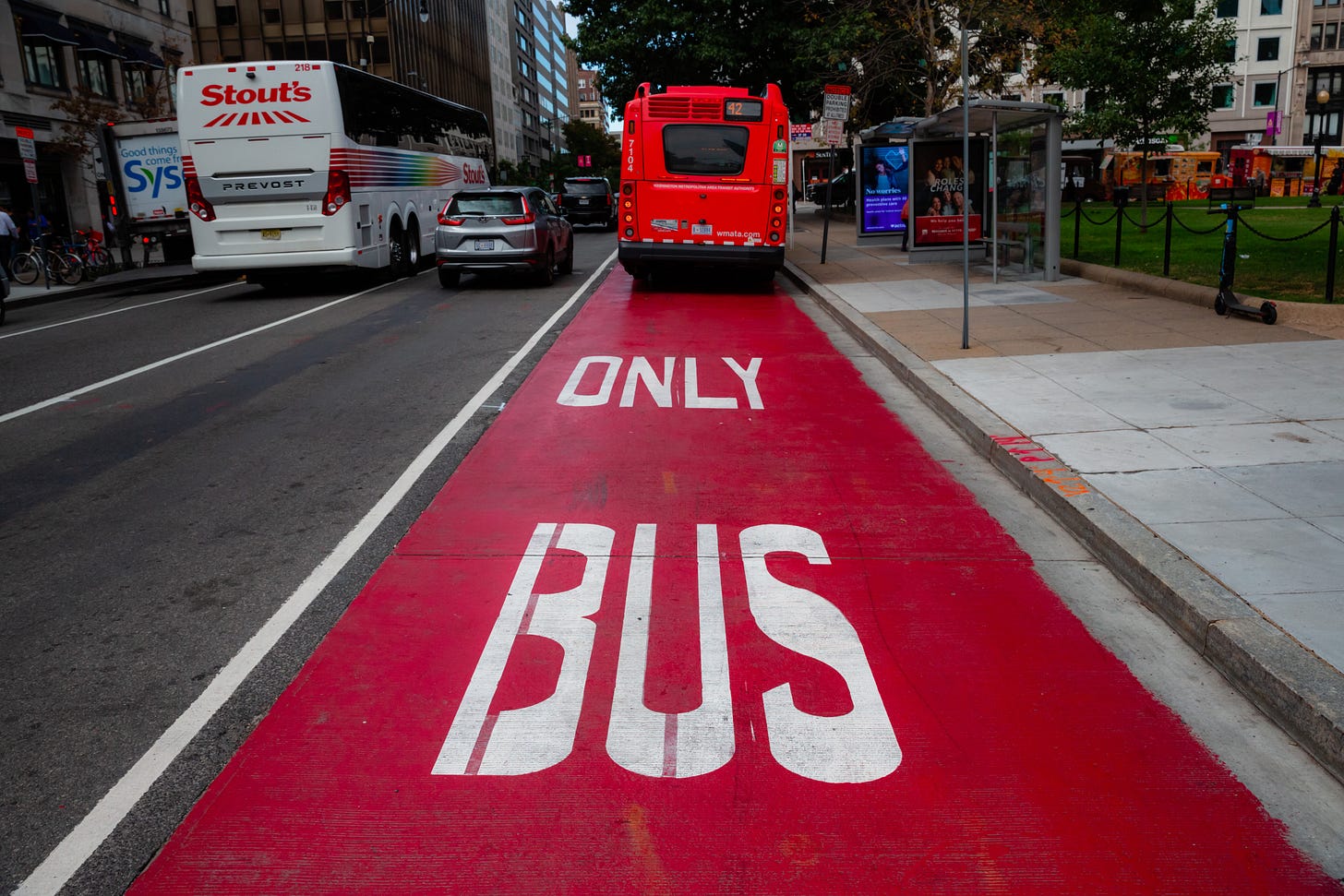MetroNow Dispatch 6.2023
This month, we urge regional collaboration on Metro’s funding woes and reforms, highlight transit wins across the region, and celebrate our federal partners for keeping Union Station on track
Facing a Fiscal Cliff, Metro Needs the Region Now More Than Ever

At its monthly board meeting last week, WMATA provided a harrowing outlook on its financials in the coming years, which should come as no surprise to MetroNow Dispatch readers. Metro is the only major transit system in the country that lacks dedicated operating funding, and with pandemic era aid drying up and inflation exacting its toll, come July 1, 2024, the region’s transit agency is staring down a $750m operating budget shortfall.
Without action from regional stakeholders, the system would be forced to enact a 67% service cut. That translates to 20-30 minute headways on all buses and trains, if they’re not cut entirely, and no nighttime service. These cuts would stop the steady ridership recovery we’ve seen since 2020 and choke the region in congestion. Failure to invest in Metro’s future would cripple mobility across the region, increasing traffic and reducing access to jobs and opportunity.
The importance of Metrorail and Metrobus to the region’s economic growth cannot be overstated. Over the years, Metro and the region have grown together, with the system having a profound effect on the quality of life for communities and people across the region. Within just a half mile radius of all Metrorail stations lies 30% of the region’s property value, 40% of the jobs, and 65% of new office and 50% of new apartment development. Metro is critical to the region’s entire transportation network, boosting economic competitiveness and access to opportunity.
And yet… regional leaders are right to ask the question, how can WMATA ensure that increased subsidies or revenues from a dedicated funding source will be well-spent? WMATA has assured that more revenue will help keep trains and buses running, but how will that money be used to improve safety measures and adopt a more automated system? Without a plan to improve operational accountability, WMATA will struggle to win over the leaders in Maryland, DC, and Virginia who must make difficult funding choices between a million and one under-funded priorities.
Metro cannot close this deficit by itself. Long-term, a dedicated and regional funding mechanism is likely the best answer, but that must come with assurances to ensure the best return on the region’s investment. Stakeholders from across the region must come together to meet the moment and find the long-term solutions needed to bring the system into good health. Through common-sense and consensus reforms aimed at improving operational accountability, we can work towards resolving WMATA’s fundamental funding challenges and position the region for economic growth for years to come.
The ScuttleBus
ScuttleBus, my dear Watson. Here are MetroNow’s top transit picks this month:
⌛ 368 Days until the Transit Cliff: FY 2025 budget starts July 1, 2024.
⛰️ $750m shortfall at the center of Metro’s June board meeting: Metro walked the public through the impending fiscal cliff and the dire consequences of inaction
💰 The Value of Transit in the region: A report from the Northern Virginia Transportation Commission found that transit generates $1.5 billion in state tax revenue
⬆️ Red, Blue, Orange, and Silver Line frequency boosts: Metro announced four lines will see service increases this month
🚍 D.C. to start bus lane enforcement: Come September, D.C. and Metro will be using 140 bus-mounted cameras to issues fines to cars driving in or blocking bus-only lanes
🚂 All aboard, Crystal City: Amtrak and VRE are designing a new and improved Crystal City station, with VRE securing $10.7m from NVTC earlier this month
🚏 Metrobus to offer nighttime “courtesy stops”: Starting June 25th, Metrobus riders can ask for a “courtesy stop” in between bus stops from 9 PM and 5 AM
⚡ $104M for zero-emission Metrobuses: Metro was awarded a $104 million federal grant for 100 electric buses and the conversion of a Fairfax bus facility to support them
✂️ Ribbon-cutting at Amazon HQ2: State and local officials marked the completion of phase one of Amazon’s transformational National Landing project
Transit Champion of the Month: Federal Railroad Administration
The Federal Railroad Administration (FRA) published the long awaited Supplemental DEIS to the original 2020 DEIS for the Washington Union Station Expansion Project. In doing so, the FRA displayed its years-long commitment to engaging the general public and transparency throughout the review process, especially with local and regional communities expected to be most affected. The MetroNow Coalition recognizes and commends the FRA for meaningfully incorporating solicited feedback into the new vision for the Preferred Alternative F, of the SDEIS that includes better bike and pedestrian access, better integration into the surrounding neighborhoods, and less station parking. It’s not too late to make your voice heard, either - the deadline to submit written comments is July 6, 2023 at 11:59 PM.
Subscribe + Share!
Sharing is caring! Share the MetroNow Dispatch with any friends, colleagues, or family members who want to join us for the ride!
Follow @MetroNow on Twitter for daily tidbits of transit gold.
Reach out to us directly with any feedback, hot takes, or ideas for future newsletter topics: info@metronow.com
The MetroNow Coalition is made up of regional leaders from the business, non-profit, and advocacy communities who believe that transit is designed to bring us together —at work, school, and play. Today, we believe our collective advocacy for better transit for the Washington DC region is more important than ever.
We launched the MetroNow Dispatch to bring residents, leaders, and transit agencies together to think about how we can make better transit today, during the pandemic, and “tomorrow,” as we look beyond recovery to how we can build a more equitable, sustainable, and accessible transportation system for our region.



